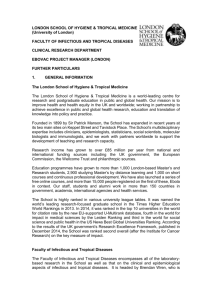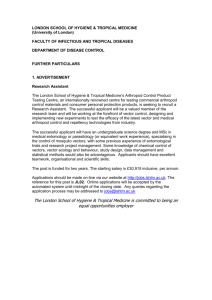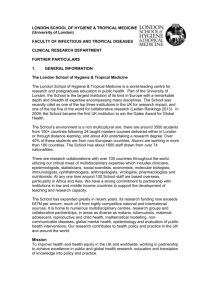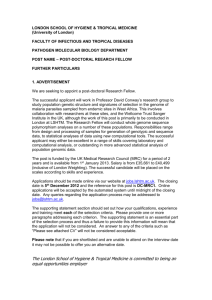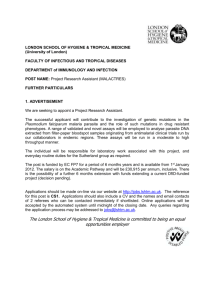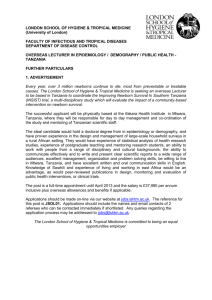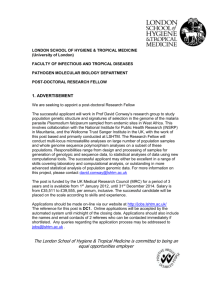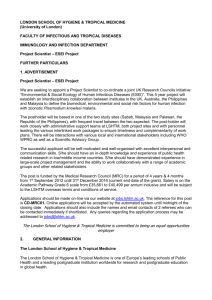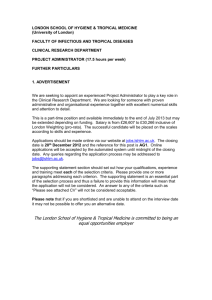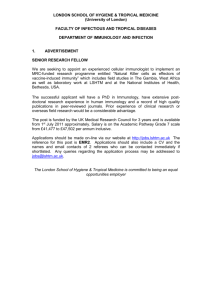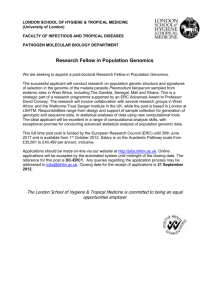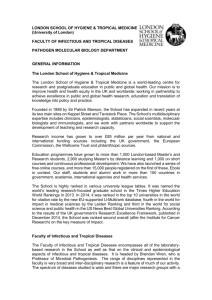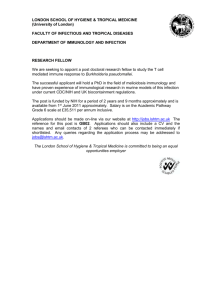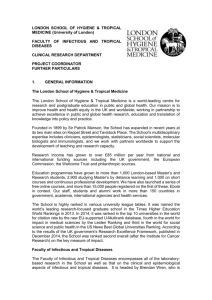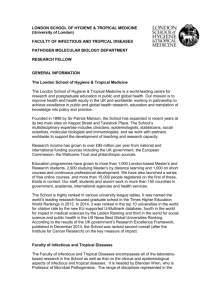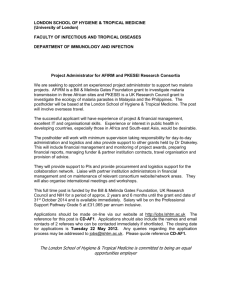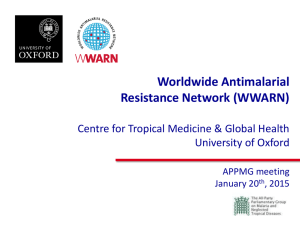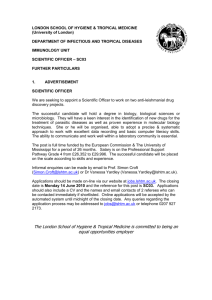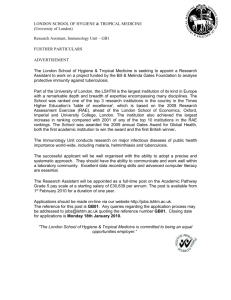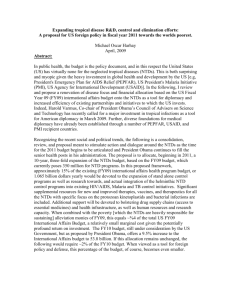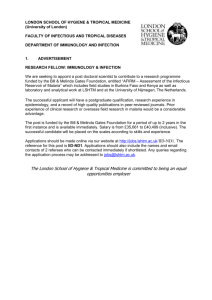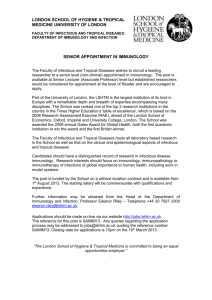LONDON SCHOOL OF HYGIENE & TROPICAL MEDICINE
advertisement
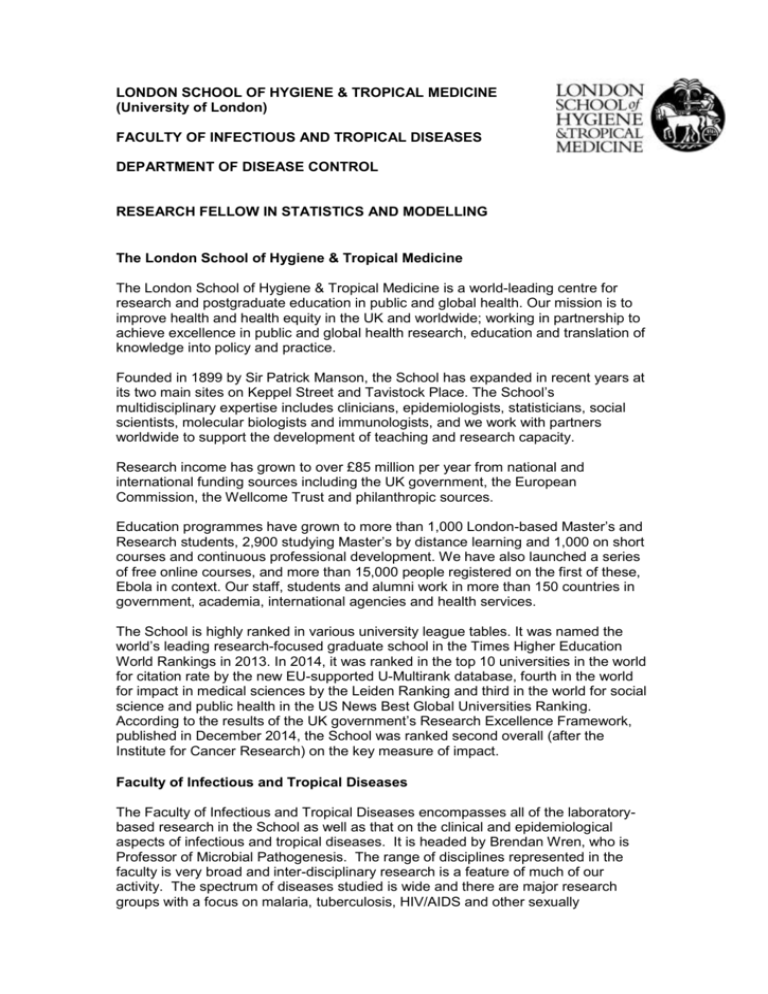
LONDON SCHOOL OF HYGIENE & TROPICAL MEDICINE (University of London) FACULTY OF INFECTIOUS AND TROPICAL DISEASES DEPARTMENT OF DISEASE CONTROL RESEARCH FELLOW IN STATISTICS AND MODELLING The London School of Hygiene & Tropical Medicine The London School of Hygiene & Tropical Medicine is a world-leading centre for research and postgraduate education in public and global health. Our mission is to improve health and health equity in the UK and worldwide; working in partnership to achieve excellence in public and global health research, education and translation of knowledge into policy and practice. Founded in 1899 by Sir Patrick Manson, the School has expanded in recent years at its two main sites on Keppel Street and Tavistock Place. The School’s multidisciplinary expertise includes clinicians, epidemiologists, statisticians, social scientists, molecular biologists and immunologists, and we work with partners worldwide to support the development of teaching and research capacity. Research income has grown to over £85 million per year from national and international funding sources including the UK government, the European Commission, the Wellcome Trust and philanthropic sources. Education programmes have grown to more than 1,000 London-based Master’s and Research students, 2,900 studying Master’s by distance learning and 1,000 on short courses and continuous professional development. We have also launched a series of free online courses, and more than 15,000 people registered on the first of these, Ebola in context. Our staff, students and alumni work in more than 150 countries in government, academia, international agencies and health services. The School is highly ranked in various university league tables. It was named the world’s leading research-focused graduate school in the Times Higher Education World Rankings in 2013. In 2014, it was ranked in the top 10 universities in the world for citation rate by the new EU-supported U-Multirank database, fourth in the world for impact in medical sciences by the Leiden Ranking and third in the world for social science and public health in the US News Best Global Universities Ranking. According to the results of the UK government’s Research Excellence Framework, published in December 2014, the School was ranked second overall (after the Institute for Cancer Research) on the key measure of impact. Faculty of Infectious and Tropical Diseases The Faculty of Infectious and Tropical Diseases encompasses all of the laboratorybased research in the School as well as that on the clinical and epidemiological aspects of infectious and tropical diseases. It is headed by Brendan Wren, who is Professor of Microbial Pathogenesis. The range of disciplines represented in the faculty is very broad and inter-disciplinary research is a feature of much of our activity. The spectrum of diseases studied is wide and there are major research groups with a focus on malaria, tuberculosis, HIV/AIDS and other sexually transmitted diseases, vaccine development and evaluation, and vector biology and disease control. The Faculty is organised into four large research departments comprising: Pathogen Molecular Biology, Immunology and Infection, Disease Control, and Clinical Research. There is close interaction between scientists in different research teams. The Faculty has strong overseas links, which provide a basis for field studies and international collaborations in developed and developing countries. The teaching programme includes MSc courses, taught in-house and by distance learning, which are modular in structure, a variety of short-courses and an active doctoral programme (PhD and DrPH). For further information on the Faculty see: http://www.lshtm.ac.uk/itd/index.html. Department of Disease Control (Head: Professor Joanna Schellenberg) This multidisciplinary Department includes epidemiologists, entomologists, anthropologists and social scientists, clinical scientists, public health engineers and geographers. This range of expertise provides us with a battery of tools for focusing on the control of diseases that are insect-borne, water-borne or associated with poor hygiene – mostly in developing countries. Much of the research can be categorised as: evaluating disease control interventions; investigating implementation strategies including working with the private sector; understanding the factors underlying household behaviour in relation to family health; or determining how control resources can be targeted most efficiently. Particular attention is paid to research directed at current health policy issues, including the gap between policy and practice. The Department's Environmental Health Group plays a leadership role in research and operational support for hygiene behaviour change, household water supply and sanitation. Three key programmes which contribute to the work of the Group are the DFID funded consortium Sanitation and Hygiene Applied Research for Equity (SHARE), the Hygiene Centre (Unilever) and the improved sanitation randomised, controlled field trial jointly funded by the Bill & Melinda Gates Foundation and International Initiative for Impact Evaluation (3ie). The Department houses the largest research group in LSHTM working on malaria control. Ongoing projects include: research capacity strengthening in Africa through the work of the Malaria Capacity Development Consortium (MCDC); novel approaches to combating malaria in pregnancy (MiP) in both Africa and India; a number of projects which develop and evaluate delivery mechanisms to improve ACT access, targeting, safety and quality, all funded by the ACT Consortium. In addition, staff are involved in studies of Seasonal Malaria Chemoprevention (SMC) in West Africa and are supporting work on the large Phase 3 clinical trial study of the RTS,S malaria vaccine in children. The Department is world-leading in applied entomology and insect borne diseases, and has provided a testing service for control products for over 20 years. The Arthropod Control Product Test Centre Arctec provides access to the Department’s valuable mosquito colonies and in-house facilities for testing of repellents, insecticides and after-bite treatments. Its entomological field sites in Tanzania, Benin, The Gambia and Kenya are involved in a variety of vector borne disease control trials. The PAMVERC alliance between LSHTM and African partners work in partnership with WHO and the manufacturing industry on product development and evaluation under laboratory and semi-field conditions and in community trials. Staff from the Department lead on studies investigating how meningococcal meningitis is spread in Africa and the impact of a new serogroup meningococcal A vaccine on reducing transmission (MenAfriCar Consortium). Staff are also assisting in the evaluation of the impact of introduction of a pneumococcal conjugate vaccine into the routine EPI programme of The Gambia and in the initial testing of a new pneumococcal protein vaccine in the same area. Also based with the Department is the IDEAS (Informed Decisions for Actions) project, which aims to improve the health and survival of mothers and babies through generating evidence to inform policy and practice. The Department also includes a major grouping of researchers using spatial analysis in public health. Teaching The School offers 19 one year full-time taught courses leading to the Master of Science (MSc) degree of the University of London and the Diploma of the London School of Hygiene and Tropical Medicine (DLSHTM). The Faculty of Infectious and Tropical Diseases runs or contributes substantially to ten of these courses and the “Immunology of Infectious Diseases” course is run from within the Department of Immunology and Infection. In addition, the Faculty is responsible for the three-month Diploma in Tropical Medicine and Hygiene (DTM&H), the Diploma in Tropical Nursing and offers a range of specialist short courses lasting usually one or two weeks. Five MSc courses are also offered by Distance-based Learning, including one on Infectious Diseases. Teaching requirements For Research Assistants and Research Fellows: To contribute to the Faculty teaching programme, up to 10% of your time per annum, subject to the policy of any funding agency (by agreement, some staff may make a greater contribution than this). Research Training The School offers two doctoral training programmes. The MPhil/PhD degrees are designed for those who wish to go on to a full time research career. The DrPH is directed towards those who expect their careers to be more in the practice of public health. Project information Neglected tropical diseases (NTDs) are a diverse group of tropical diseases that mostly affect the poor, and in recent years real progress has been made in reducing the disease burden due to NTDs. Quantifying how the spatial patterns of NTDs have changed in recent years is important to understand much of this change is due to specific interventions and how risks might change as strategies in control evolve in the future. Furthermore, as progress in control is made, it is important to identify the best approach to the monitoring and surveillance of NTDs. The successful applicant will help develop innovative techniques to analyse the spatial distribution of NTDs (together with associated disease burden) and develop simulation algorithms to evaluate alternative sampling and surveillance strategies. For more information, visit www.thiswormyworld.org. JOB DESCRIPTION Post: Research Fellow in Statistics and Modelling Grade: Research Fellow Responsible to: Rachel Pullan Department: Department of Disease Control Main duties and responsibilities: The main duties of the Research Fellow will include to: Undertake geospatial analysis and modelling of disease distributions. Use computer simulation to evaluate alternative sampling and surveillance strategies for NTDs. Develop and implement new computational and statistical methods, including simulation algorithms to generate epidemiologically realistic data and evaluate alternative sampling and surveillance strategies. Deliver analytical input into the Global Burden of Disease Study in order to generate high spatial resolution DALY estimates for specific NTDs. Provide high-level statistical support to wider group working on the Global Burden of Disease Study. Identify or source additional information that could potentially help the investigation as the analysis progresses Prepare journal articles and address conferences, seminars and the media to disseminate research findings. Contribute to the Faculty teaching programme, up to 10% of your time per annum, subject to the policy of any funding agency (by agreement, some staff may make a greater contribution than this). Demonstrate continuous specialist development by acquiring and refining relevant skills and expertise in new or related areas through internal or external development activities. Contribute to the academic life of the School and build relationships and contacts to facilitate the future exchange of information. PERSON SPECIFICATION Ideal candidates will have the following attributes and experience: Essential characteristics: PhD-level qualification in statistics, mathematical modelling, statistical epidemiology, quantitative ecology, quantitative geography or relevant quantitative subject Extensive experience in computer simulation and statistical modelling Demonstrable experience in epidemiological and / or ecological analysis Strong programming skills in R Attention to detail and highly organised Ability to work independently and as a member of a multi-disciplinary scientific team Excellent written and verbal communication skills, including good publication record Desirable qualifications and skills: 5. Experience in GIS, including demonstrated experience in handling point, polygon and raster spatial data A theoretical and practical understanding of infectious disease epidemiology SALARY AND CONDITIONS OF APPOINTMENT The post is funded until 30 June 2017. Salary is on the Academic Pathway Salary scale from £37,106- £42,560 per annum. Annual leave entitlement is 30 working days per year for all staff (pro-rata for part-time staff). In addition, staff are entitled to public holidays and Director’s days on which the School is closed. 6. ASYLUM AND IMMIGRATION The School will comply with the Immigration, Asylum and Nationality Act 2006, which requires all employees to provide documentary evidence of their legal right to work in this country prior to commencing employment. Candidates will be required to bring their passport (and visa if applicable) to interview so that it can be copied and verified. This role does not meet the minimum requirements set by UK Visas and Immigration to enable sponsorship of migrant workers. Therefore we cannot progress applications from candidates who require sponsorship to work in the UK Further information about Certificate of Sponsorship and eligibility to work in the UK, can be found at: www.ukba.homeoffice.gov.uk/employers/points APPLICATIONS Applications should be made online via our website at http://jobs.lshtm.ac.uk The reference for this post is RP1RFSM. Applications should also include the names and email contacts of 2 referees who can be contacted immediately if shortlisted. Online applications will be accepted by the automated system until 10pm on the closing date. Any queries regarding the application process may be addressed to jobs@lshtm.ac.uk.
